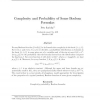Free Online Productivity Tools
i2Speak
i2Symbol
i2OCR
iTex2Img
iWeb2Print
iWeb2Shot
i2Type
iPdf2Split
iPdf2Merge
i2Bopomofo
i2Arabic
i2Style
i2Image
i2PDF
iLatex2Rtf
Sci2ools
114
click to vote
CPC
1998
1998
Complexity and Probability of Some Boolean Formulas
For any Boolean functionf letL(f) be its formulasizecomplexityin the basis f^ 1g. For every n and every k n=2, we describe a probabilistic distribution on formulas in the basis f^ 1g in some given set of n variables and of the size at most `(k) = 4k. Let pn k(f) be the probability that the formula chosen from the distribution computes the function f. For every function f with L(f) `(k) , where = log4(3=2), we have pn k(f) > 0. Moreover, for every function f, if pn k(f) > 0, then (4n);`(k) pn k(f) c;`(k)1=4 where c > 1 is an absolute constant. Although the upper and lower bounds are exponentially small in `(k), they are quasipolynomially related whenever `(k) ln (1) n. The construction is a step towards developping a model appropriate for investigation of the properties of a typical (random) Boolean function of some given complexity. Keywords Complexity, probability, Boolean formulas 1This research was supported by GA CR, Grant No. 201/95/0976, and by Heinrich-Hertz-Stiftung w...
Related Content
| Added | 22 Dec 2010 |
| Updated | 22 Dec 2010 |
| Type | Journal |
| Year | 1998 |
| Where | CPC |
| Authors | Petr Savický |
Comments (0)

